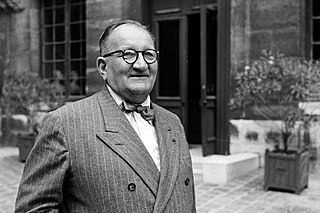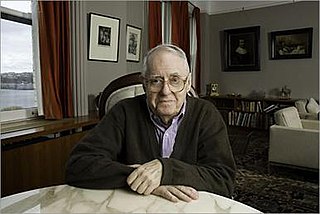Top 808 Phenomena Quotes & Sayings - Page 14
Explore popular Phenomena quotes.
Last updated on April 20, 2025.
While, on the one hand, the end of scientific investigation is the discovery of laws, on the other, science will have reached its highest goal when it shall have reduced ultimate laws to one or two, the necessity of which lies outside the sphere of our cognition. These ultimate laws-in the domain of physical science at least-will be the dynamical laws of the relations of matter to number, space, and time. The ultimate data will be number, matter, space, and time themselves. When these relations shall be known, all physical phenomena will be a branch of pure mathematics.
Every man is more than just himself; he also represents the unique, the very special and always significant and remarkable point at which the world's phenomena intersect, only once in this way, and never again. That is why every man's story is important, eternal, sacred; that is why every man, as long as he lives and fulfills the will of nature, is wondrous, and worthy of consideration. In each individual the spirit has become flesh, in each man the creation suffers, within each one a redeemer is nailed to the cross.
The phenomena of the year take place every day in a pond on a small scale. Every morning, generally speaking, the shallow water isbeing warmed more rapidly than the deep, though it may not be made so warm after all, and every evening it is being cooled more rapidly until the morning. The day is an epitome of the year. The night is the winter, the morning and evening are the spring and fall, and the noon is the summer. The cracking and booming of the ice indicate a change of temperature.
Shallow ecology is anthropocentric, or human-centred. It views humans as above or outside nature, as the source of all value, and ascribes only instrumental, or 'use', value to nature. Deep ecology does not separate humans - or anything else - from the natural environment. It does see the world not as a collection of isolated objects but as a network of phenomena that are fundamentally interconnected and interdependent. Deep ecology recognizes the intrinsic value of all human beings and views humans as just one particular strand in the web of life.
I have hitherto followed the lines marked out by the Theist in his attempt to prove that there exists a mind behind natural phenomena, and that the universe as we have it is, at least generally, an evidence of a plan designed by this mind. I have also pointed out that the only datum for such a conclusion is the universe we know. We must take that as a starting point. We can get neither behind it nor beyond it. We cannot start with God and deduce the universe from his existence; we must start with the world as we know it, and deduce God from the world.
Donald Trump is an especially depressing phenomena because he is so debased and debasing and millions and millions of people want him to be president. We're seeing how at least whole swathes of white America are becoming your worst nightmare of eternal Zombie High School. Something like a perfect mix of Groundhog Day and The Moronic Inferno. How can it be that a guy who looks like a bloated cadaver pulled from the Gowanus canal, with some rouge on his cheeks and a sticky Something About Mary wig, is actually applauded by his followers for making fun of how other people look?
Poetry is related to philosophy as experience is related to empirical science. Experience makes us acquainted with the phenomenon in the particular and by means of examples, science embraces the whole of phenomena by means of general conceptions. So poetry seeks to make us acquainted with the Platonic Ideas through the particular and by means of examples. Philosophy aims at teaching, as a whole and in general, the inner nature of things which expresses itself in these. One sees even here that poetry bears more the character of youth, philosophy that of old age.
Thus far I have explained the phenomena of the heavens and of our sea by the force of gravity, but I have not yet assigned a cause to gravity. Indeed, this force arises from some cause that penetrates as far as the centers of the sun and planets without any diminution of its power to act, and that acts not in proportion to the quantity of the surfaces of the particles on which it acts (as mechanical causes are wont to do) but in proportion to the quantity of solid matter, and whose action is extended everywhere to immense distances, always decreasing as the squares of the distances.
Power always acts destructively, for its possessors are ever striving to lace all phenomena of social life into a corset of their laws to give them a definite shape. Its mental expression is dead dogma; its physical manifestation of life, brute force. This lack of intelligence in its endeavours leaves its imprint likewise on the persons of its representatives, gradually making them mentally inferior and brutal, even though they were originally excellently endowed. Nothing dulls the mind and soul of man as does the eternal monotony of routine, and power is essentially routine.
A. Douglas Stone, a physicist who has spent his life using quantum mechanics to explore striking new phenomena, has turned his considerable writing skills to thinking about Einstein and the quantum. What he finds and makes broadly understandable are the riches of Einstein's thinking not about relativity, not about his arguments with Bohr, but about Einstein's deep insights into the quantum world, insights that Stone shows speak to us now with all the vividness and depth they had a century ago. This is a fascinating book, lively, engaging, and strong in physical intuition.
Why are there organized beings? Why is there something rather than nothing? Here again, I fully understand a scientist who refuses to ask it. He is welcome to tell me that the question does not make sense. Scientifically speaking, it does not. Metaphysically speaking, however, it does. Science can account for many things in the world; it may some day account for all that which the world of phenomena actually is. But why anything at all is, or exists, science knows not, precisely because it cannot even ask the question.
We've learned from experience that the truth will out. Other experimenters will repeat your experiment and find out whether you were wrong or right. Nature's phenomena will agree or they'll disagree with your theory. And, although you may gain some temporary fame and excitement, you will not gain a good reputation as a scientist if you haven't tried to be very careful in this kind of work. And it's this type of integrity, this kind of care not to fool yourself, that is missing to a large extent in much of the research in Cargo Cult Science.
Most students of nature sooner or later pass through a process of writing off a large percentage of their supposed capital of knowledge as a merely illusory asset. As we trace more accurately certain familiar sequences of phenomena we begin to realize how closely these sequences, or laws , as we call them, are hemmed round by still other laws of which we can form no notion. With myself this writing off of illusory assets has gone rather far and the cobweb of supposed knowledge has been pinched (as some one has phrased) into a particularly small pill.
A century ago mainstream science was still quite happy to countenance vital and mental powers which had a 'downwards' causal influence on the physical realm in a straightforwardly interactionist way. It was only in the middle of the last century that science finally concluded that there are no such non-physical forces. At which point a whole pile of smart philosophers (Feigl, Smart, Putnam, Davidson, Lewis) quickly pointed out that mental, biological and social phenomena must themselves be physical, in order to produce the physical effects that they do.
Physical science enjoys the distinction of being the most fundamental of the experimental sciences, and its laws are obeyed universally, so far as is known, not merely by inanimate things, but also by living organisms, in their minutest parts, as single individuals, and also as whole communities. It results from this that, however complicated a series of phenomena may be and however many other sciences may enter into its complete presentation, the purely physical aspect, or the application of the known laws of matter and energy, can always be legitimately separated from the other aspects.
A mature person has the integrity to stand alone. And when a mature person gives love, he or she gives without any strings attached to it. When two mature persons are in love, one of the great paradoxes of life happens, one of the most beautiful phenomena: they are together and yet tremendously alone. They are together so much that they are almost one. Two mature persons in love help each other to become more free. There is no politics involved, no diplomacy, no effort to dominate. Only freedom and love.
It is impossible! It has never happened - it cannot happen in the very nature of things. Marriage is something against nature. Marriage is an imposition, an invention of man - certainly out of necessity, but now even that necessity is out of date. It was a necessary evil in the past, but now it can be dropped. And it should be dropped: man has suffered enough for it, more than enough. It is an ugly institution for the simple reason that love cannot be legalized. Love and law are contradictory phenomena.
So you see,' said Stepan Arkadyich, 'you're a very wholesome man. That is your virtue and your defect. You have a wholesome character, and you want all of life to be made up of wholesome phenomena, but that doesn't happen. So you despise the activity of public service because you want things always to correspond to their aim, and that doesn't happen. You also want the activity of the individual man always to have an aim, that love and family life always be one. And that doesn't happen. All the variety, all the charm, all the beauty of life are made up of light and shade.
I do not deny God, because that word conveys to me no idea, and I cannot deny that which presents to me no distinct affirmation, and of which the would-be affirmer has no conception. I cannot war with a nonentity. If, however, God is affirmed to represent an existence which is distinct from the existence of which I am a mode, and which it is alleged is not the noumenon of which the word I represents only a speciality of phenomena, then I deny God, and affirm that it is impossible God can be.
Teach your scholar to observe the phenomena of nature; you will soon rouse his curiosity, but if you would have it grow, do not be in too great a hurry to satisfy this curiosity. Put the problems before him and let him solve them himself. Let him know nothing because you have told him, but because he has learnt it for himself. Let him not be taught science, let him discover it. If ever you substitute authority for reason he will cease to reason; he will be a mere plaything of other people's thoughts.
There were profound reasons for his attachment to the sea: he loved it because as a hardworking artist he needed rest, needed to escape from the demanding complexity of phenomena and lie hidden on the bosom of the simple and tremendous; because of a forbidden longing deep within him that ran quite contrary to his life's task and was for that very reason seductive, a longing for the unarticulated and immeasurable, for eternity, for nothingness. To rest in the arms of perfection is the desire of any man intent upon creating excellence; and is not nothingness a form of perfection?
The people in the world, and the objects in it, and the world as a whole, are not absolute things, but on the contrary, are the phenomena of perception... If we were all alike: if we were millions of people saying do, re, mi, in unison, One poet would be enough... But we are not alone, and everything needs expounding all the time because, as people live and die, each one perceiving life and death for himself, and mostly by and in himself, there develops a curiosity about the perceptions of others. This is what makes it possible to go on saying new things about old things.
I roamed the countryside searching for the answers to things I did not understand. Why shells existed on the tops of mountains along with the imprints of coral and plant and seaweed usually found in the sea. Why the thunder lasts a longer time than that which causes it and why immediately on its creation the lightening becomes visible to the eye while thunder requires time to travel. How the various circles of water form around the spot which has been struck by a stone and why a bird sustains itself in the air. These questions and other strange phenomena engaged my thought throughout my life.
Learning to explain phenomena such that one continues to be fascinated by the failure of one's explanations creates a continuing cycle of thinking, that is the crux of intelligence. It isn't that one person knows more than another, then. In as sense, it is important to know less than the next person, or at least to be certain of less, thus enabling more curiosity and less explaining away because one has again encountered a well-known phenomenon. The less you know the more you can find out about, and finding out for oneself is what intelligence is all about.
Freud, Jung thought, had been a great discoverer of facts about the mind, but far too inclined to leave the solid ground of "critical reason and common sense." Freud for his part criticized Jung for being gullible about occult phenomena and infatuated with Oriental religions; he viewed with sardonic and unmitigated skepticism Jung's defense of religious feelings as an integral element in mental health. For Freud, religion was a psychological need projected onto culture, the child's feeling of helplessness surviving in adults, to be analyzed rather than admired.
The mathematical thermology created by Fourier may tempt us to hope that, as he has estimated the temperature of the space in which we move, me may in time ascertain the mean temperature of the heavenly bodies: but I regard this order of facts as for ever excluded from our recognition. We can never learn their internal constitution, nor, in regard to some of them, how heat is absorbed by their atmosphere. We may therefore define Astronomy as the science by which we discover the laws of the geometrical and mechanical phenomena presented by the heavenly bodies.
Throughout his life, Albert Einstein would retain the intuition and the awe of a child. He never lost his sense of wonder at the magic of nature's phenomena-magnetic fields, gravity, inertia, acceleration, light beams-which grown-ups find so commonplace. He retained the ability to hold two thoughts in his mind simultaneously, to be puzzled when they conflicted, and to marvel when he could smell an underlying unity. "People like you and me never grow old," he wrote a friend later in life. "We never cease to stand like curious children before the great mystery into which we were born.


























